|
|
|
| |
| Welcome note by the SN Spokesperson |
|
| |
|
|
| |
| |
Dear members of SNRD Asia and the Pacific,
It is our pleasure to share our latest newsletter issue with you. Enjoy reading and see what impressive activities colleagues all over our region are realizing!
Besides the many articles shared, we, at SNRD Asia and the Pacific, are eager to share some updates with you from our end.
Due to the pandemic situation, it was decided that this year the joint SNRD Asia - TUEWAS conference will happen one more time virtually (from 25-29 October 2021). Despite the fact that we are all looking forward to meet again in person (we strongly believe in 2022!) we are still convinced to have a very interesting and exciting program ready for you in this year’s virtual format.
We are equally happy to share the news that we were able to expand this year’s funding through the SNRD Asia and the Pacific Learning and Innovation Fund and that previously submitted proposals with a total volume of more than 50.000 EUR will receive funding over the course of this year.
In parallel we started our SNRD Asia and the Pacific – Future Fit Process through which we want to make our sector network even more agile and open to new “hot topics” that are coming up as our portfolio is also constantly changing. Soon, we plan to have a charter ready that will outline how we can accommodate – in addition to our active working groups – also short-term exchange formats, tackling topics of interest of our members.
Along this line of thinking we are organizing the first SNRD Asia and the Pacific – Virtual Networking Event (on 8 July 2021, 3.30-4.30 PM Bangkok Time). We are happy that Ms. Kerstin Nagels, Head of the APLAK Division, will be opening the event and will be giving us an interview at the start and share her insights and views on trends from APLAK perspective.
The overall idea of the event is to create a space for colleagues to exchange on new topics of interest, pose questions, search collaborators and learn from each other. All in an easy and enjoyable format over a virtual coffee.
Because this lives from a vivid participation, we would like to invite you to join us! You can either a) just tune in and listen what is going on across the sector network. or b) in 3-min “pitches” “share news or information relevant for colleagues in the region” or c) “seek collaborators” on certain topics or “just ask a question or solicit ideas from colleagues of your sector network. You can also d) get an own 20-break-out room-session organized for you by our team, to deepen the discussion on your topic of choice further e) propose the foundation of a new working group or temporary task force and potentially secure SNRD Asia and the pacific seed money of up to 10.000 EUR. Should you be interested, our secretariat team is eager to support you and provide all necessary information. Just drop us a line: snrd.asia@giz.de.
çNow enjoy reading and as always, should you have any feedback related to our work, thoughts or ideas, we are very happy to receive your feedback.
çThank you very much, stay healthy and kind regards,
Matthias Radek (SNRD AP Spokesperson), Donaya Siamwalla (SNRD AP Network Manager and Public Relations Officer), Wilaiwan Photharam (SNRD AP Assistant), and Neha Singh (SNRD AP Assistant)
|
|
|
|
|
|
|
| |
|
| |
| SNRD Asia and the Pacific First Networking Event! |
|
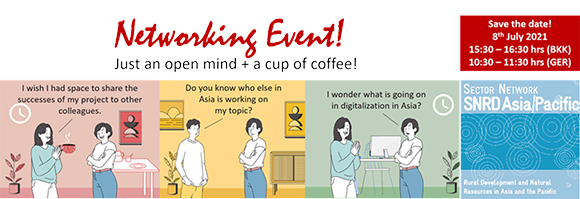
SNRD Asia and the Pacific is organising the first virtual “Networking Event” on Thursday 8th July 2021, 15:30 – 16:30 hrs (Bangkok time).
Have you ever want to;
- discuss “topics” with “likeminded colleagues” in the region
- showcase the achievements with the “entire” sector network
- get “inspiration” from other colleagues
- “kick start” new initiatives and get “seed funding” up to 10,000 Euro (Hassle free process with support from the secretariat)
You shouldn’t miss the chance to join our event!
We created this “virtual” networking opportunity to;
- Build stronger connections amongst the members
- Share the latest news, trends, and upcoming events from the region
- Pick up hot topics i.e. digitalisation, gender, private sector collaboration
The event will start with the trend setting statement from Ms. Kerstin Nagels, Head of the APLAK Division / FMB representatives the short introduction of the “hot topics” in which you can have an in-dept discussion in the smaller group exchange. The event is open, free of charge, for SNRD Asia and the Pacific members and those who are working or interested in the field of Natural Resources and Rural Development.
Would you like to propose a “topic” yourself?
Write to us via snrd-asia@giz.de and our team will do the rest to assist you!
>>>> Click here to join the meeting <<<<
We look forward to welcoming you to our Networking Event!
Best wishes
SNRD Asia and the Pacific Secretariat
Matthias, Donaya, Wilaiwan, Neha
|
 |
|
|
|
|
| |
| New Projects in SNRD Asia and the Pacific! |
|
We are welcoming these projects to SNRD Asia and the Pacific!
Strengthening the resilience of poor population groups under climate change
The objective for the project is climate resilience – resilience to climate change – is enhanced in selected agricultural value chains in the project regions.
Country: Regional Project
Timeframe: March 1, 2021 to February 29, 2024
Project volume: 6,000,000 €
Contact Person
Hanna Bartels – Advisor
Assistance to the International Alliance against Health Risks in the Trade of Wildlife and their Products
The objective of this project is for international alliance to be successfully disseminated and applied approaches to reduce environmental, human and animal health risks in the trade of wild animals and wild animal products along the value chain.
Country: Global Project
Timeframe: January 1, 2021 to December 31, 2023
Project volume: 8,000,000 €
Contact Person
Constanze Riedle – Project Manager
Sector Project Agriculture
What this project works on is advising BMZ, which means that-experiences, positions and concepts of German Development Cooperation to promote sustainable agriculture are incorporated into national and international process and agenda setting is supported.
Country: Global Project
Timeframe: April 1, 2021 to March 31, 2024
Project volume: 13,000,000 €
Contact Person
Heike Hoeffler – Project Manager
Conservation and sustainable use of biodiversity and ecosystem services of forests in Vietnam
The objective of the project is for the national and provincial government institutions responsible for the management of protected areas in Viet Nam to implement mechanisms that provide local biodiversity and sustainable forest management services to local populations.
Country: Vietnam
Timeframe: January 1, 2018 to December 31, 2021
Project volume: 5,100,000 €
Contact Person
Anja Barth – Project Manager
Sustainable Management of Forest Ecosystem Services in the Western Himalaya
The project supports the increased orientation of forest management towards FES with a focus on water availability at the partner states. This Technical Cooperation (TC) is an initiative for strengthening the paradigm shift in the forest developmental policies and procedures towards the FES and participatory forest management centric approach, so that forests are managed sustainably for the most important ecosystem services. See more in the newsletter!
Country: India
Timeframe: January 1, 2021 to December 31, 2023
Project volume: 3,850,000 €
Contact Person
Ravindra Singh – Principal Advisor
|
 |
|
|
|
|
|
| |
| News from partner projects & initiatives from the region and from HQ |
|
| |
|
|
| |
| INA Project: Female, single, young seeks... |
|
INA is a quite young initiative and is looking for new partners. Founded in November 2018 on behalf of the German Federal Ministry for Economic Cooperation and |
Development, INA (german acronym for Initiative for Sustainable Agricultural Supply Chains) is an open platform of players from the private sector, civil society, and politics. Together we want to achieve greater sustainability across global agricultural supply chains and improve the living conditions of smallholders. To this end, we cooperate with top German brands and lead firms in their respective supply chains. Read More
Link to Website, LinkedIn, Twitter, Instagram
Link to Publication on Living Income and Wages
Link to Information on INATrace
Contact Person
INA Team
|
|
|
|
|
|
| |
| Global and virtual health and wellbeing classes |

First Banter shop of campaign in Panaji
Credit: Dilshad Ahmad |
|
|
|
If working remotely during the pandemic has taught us anything, two things stand out: mobile work has made us quite immobile and digitalization can be used to get us moving again. The Cooperate Health Management Team of GIZ is pleased to announce our first collaborative list of global and virtual health and wellbeing classes from Aerobics in India to Zumba in Mexico with a full-core-workout in Serbia and after-work-yoga in Uganda in between. There are two programs to choose from – We cordially invite you to click on the links below and browse through both our international and German programs to find |
a suitable offer for you: International (Virtual Health Classes), German (Virtuelles Gesundheitsangebot). More information about the offers can be found on the IDA Community. Please note that for online classes which are not offered through MS-Teams or other GIZ-approved tools, private end devices must be used. We would love to expand our global offers and are hoping for more contributions. If you also have health and wellbeing classes being offered in your country and/or in other languages which you would like to open up to GIZ worldwide, please contact us (gesundheitsmanagement@giz.de).
Tip: Subscribe to the Community right away, because as a user you will have direct access to all health management offers.
Contact Person
Cooperate Health Management Team
|
|
|
|
|
|
|
| |
| Updates, latest development & knowledge sharing |
|
| |
|
|
| |
| Working Group Agriculture |
|
| Berau secures forest areas while improving palm oil plantations governance |
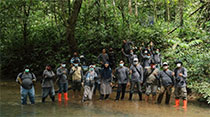
| Participants of training on HCV/HCS identification (Source: LEOPALD team, 2021) |
|
|
|
Berau District Government in Indonesia demonstrates their commitment to saving high conservation value areas while improving the sustainability of the palm oil sector. Through the Low-emissions oil palm development project (LEOPALD), GIZ and The Nature Conservancy have been supporting the Berau District Government in improving land use governance of the plantation sector. Read More |
Contact Person
Ade Cahyat - Principal Advisor
The Low-emissions oil palm development project, GIZ Indonesia
Key buzzwords
Palm oil, biodiversity, high conservation value
|
|
|
|
|
| |
| OLAM and GIZ: An ever-strong partnership for sustainable development |
|
OLAM International – a leading food and agri-business – and GIZ have had a long-standing and successful cooperation of more than 12 years. As of now, both organizations are collaborating on six value chains (including coffee, cashew nuts, cotton, rice, cacao, rubber) in nine different countries across Asia, Africa and South America via |
various modes of cooperation. On May 21, 2021, Mrs. Tanja Goenner, Chair of the Management Board of GIZ and Mr. Sunny Verghese, Co-founder and Group CEO of Olam International Limited met to discuss how to foster this growing partnership to enable a wider impact and reach, develop technical solutions together, and combine their diverse networks. Both OLAM and GIZ envision a world where people earn a fair income and rise above poverty, where children can go to school instead of having to work, where forests are preserved and not cut down, and where natural resources are protected and revived. Based on these common objectives, the strategic exchange was an important step towards institutionalizing this partnership. Why go the journey alone when the SDGs will be achieved much better and quicker together? Stay tuned!
Contact Person
Matthias Bickel - Program Manager
Agriculture Cluster, GIZ Thailand
|
 |
|
|
|
|
| |
| Regenerative organic agriculture helps to improve coconut farmers’ livelihoods in Thailand |
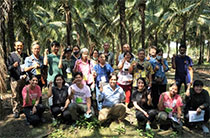
| ReCAP Pilot Farmers’ Reunion at the Aromatic Farm in Damnoen Saduak district, Ratchaburi province |
|
|
|
Since its launch in June 2020, the Regenerative Coconuts Agriculture Project (ReCAP) has provided coconut farmers in piloted provinces of Samutsakhon, Samutsongkram, Nakhonpatom and Ratchaburi with a series of trainings on regenerative organic agriculture. The first batch of 13 coconut farmers have so far learned practical techniques to enhance the sustainability of their coconut farms, while remaining profitable. The project showcases Thailand’s first collaboration between Danone Ecosystem Fund, Harmless Harvest and GIZ. The aim is to transform conventional |
practices of coconut farmers towards regenerative organic practices, thereby reducing their impact on climate change and strengthening the livelihoods of farmers and local coconut farming communities. Coconuts are one of Thailand’s most important crops with 90.61 tonnes exported to the top three markets in the United States (582.23 million baht), Hong Kong (221.74 million baht) and Germany (83.31 million baht) based on the export value at 3.39 billion baht in 2019. Read More
Contact Person
Apiradee Treerutkuarkul - Senior Communication Officer
Agriculture and Food Cluster
|
 |
|
|
|
|
| |
| Shop using waste as a currency in India |

First Banter shop of campaign in Panaji
Credit: Dilshad Ahmad |
|
|
|
Shop with your waste (SWYW) campaign is a cash free barter system that allows the trade of recycled materials in communities for necessities, goods & services. People bring in recyclable waste and exchange it for daily household items like chips, cookies, soft drinks etc. GIZ India under the project Development and Management of Nationally Appropriate Mitigation Actions (NAMA) in India commissioned by BMU initiated campaign design and implementation in 5 stores in the state of Goa. First 3 stores came in Panaji. GIZ India’s DeveloPPP.de project with |
private partner, Karo Sambhav replicated the campaign in 2 more stores in Mapusa.
Link to further information
Contact Person
Vaibhav Rathi - Technical Advisor
GIZ India
|
|
|
|
|
|
| |
| Sustainability and Value Added in Agricultural Supply Chains in Indonesia Project (SASCI+) |
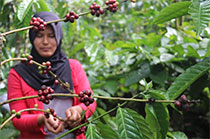
Coffee harvesting in Lore Lindu, Indonesia
Credit: Ismet Khaeruddin |
|
|
|
The global program “Sustainability and Value Added in Agricultural Supply Chains” is part of the special initiative “ONE WORLD – No Hunger” (SEWOH). On behalf of the German Federal Ministry for Economic Cooperation and Development (BMZ), the program promotes the sustainability of selected agricultural supply chains in partner countries. In Indonesia, the global program works through the project “Sustainability and Value Added in Agricultural Supply Chains in Indonesia” (SASCI+). Read More |
Contact Person
Jonas Dallinger - Principal Advisor
SASCI+ in Indonesia
Key buzzwords
Sustainability, value added, supply chain, agriculture, Indonesia, cocoa, coffee, palm oil, rubber
|
|
|
|
|
| |
| Utilising online platform to enhance sustainable palm oil knowledge and capacity in Thailand |

| Online TOPSA training-the-trainers session led by academic coach Ampai Kedsatith |
|
|
|
The ongoing COVID-19 crisis has undoubtedly affected offline business and activities at all levels. Several planned training programmes have been postponed due to a strict measure of COVID-19 control and physical distancing. Sustainable and Climate-Friendly Palm Oil Production and Procurement (SCPOPP) in Thailand also adopts the online training as a platform for those interested trainers, including representative from palm oil mills, smallholders, extension officials from the Department of Agricultural Extension (DOAE) and experts from universities, to share their views and lessons learned on sustainable palm oil production. Read More |
Contact Person
Apiradee Treerutkuarkul - Senior Communication Officer
Agriculture and Food Cluster
|
|
|
|
|
| |
| Virtual dialogue by the German Federal Ministry for Economic Cooperation and Development (BMZ) and producing countries on commodity-driven deforestation |
|
Towards autumn, the European Commission will present a legislative proposal to minimise deforestation and forest degradation in agricultural supply chains. Therefore, Dr. Maria Flachsbarth, Parliamentary State Secretary in BMZ, invited producing countries to a virtual dialogue on joint measures on supply and demand side to minimise |
deforestation driven by the expansion of agriculture on 26 May. From BMZ’s perspective, producing countries should be supported through EU Forest Partnerships in light of the new regulation. Among the panelists were the ambassadors of Indonesia and Colombia, Andri Hadi and Felipe Gracia Echeverri, as well as Florika Fink-Hooijer, Director-General of DG Environment of the European Commission, Carla Montesi, Director of DG International Partnerships, Hindou Oumarou Ibrahim as representative of the indigenous communities, as well as Heidi Hautala, Vice President of the European Parliament. Read More
Link to further materials
Contact Person
Maike Möllers - Senior Advisor
GIZ Germany
Franziska Rau - Advisor
GIZ Belgium
Simon Gmeiner - Technical Junior Advisor
GIZ Belgium
Key buzzwords
Deforestation, forest degradation, deforestation-free supply chains, virtual dialogue, forest partnerships, legislative proposal
|
 |
|
|
|
|
| |
| Working Group Biodiversity |
|
| Counting Winged Visitors: Pong Bird Census Film |
|
For more than two decades, the Wildlife Division of Himachal Pradesh Forest Department in India has been conducting the annual waterbird census. This training film follows them on their census exercise at the Pong dam wetland, showcasing the step-by-step process of conducting this exercise and its contribution towards better management of the wetland. |
Link to film
Contact Person
Ravindra Singh - Programme Director
Indo-German Biodiversity Programme
Key buzzwords
Wetlands, biodiversity, Ramsar, Himachal Pradesh
|
|
|
|
|
| |
| Drones for enhanced surveillance and to strengthen conservation of the Sundarbans |

| Honorable Deputy Minister Ms. Habibun Nahar observing the lightweight drone flying in presence of BFD and GIZ high officials. Credit: Minhazul Hoque Ashik |
|
|
|
Sundarbans Management Project (SMP) with the support of Bangladesh Forest Department (BFD) was organised a four-day long (19 - 22 March 2021) training on “Light-weight drone pilot training for conservation and monitoring of the Sundarbans”. Twelve BFD frontline staff participated in the training. The objective is to build the capacity of BFD staff on practical use of the instrument and piloting of the drones. To support that initiative SMP handed over four Mavic Air 2 light weight drones to BFD for forest impact monitoring, patrolling and research. Deputy Minister Ms Habibun Nahar, Member of Parliament, Ministry of Environment, Forest and Climate Change, inaugurated the event. |
Link to IDA publication
Link to further materials
Contact Person
Stefan Alfred Groenewold - Principal Advisor
Support to the Management of the Sundarbans Reserved Forest (SMP II)
Key buzzwords
Pandemic, Access Services, Drone, Conservations, Sundarbans
|
 |
|
|
|
|
| |
| Forest Ecosystem Services: Managing Forests Sustainably |
|
Forests contribute to human wellbeing. They provide numerous tangible and intangible benefits called ‘Forest Ecosystem Services’ (FES). The film showcases how the FES approach was integrated into the state forest management of Himachal Pradesh, India, under the Indo-German HP-FES project. |
Link to film
Link to further information
Contact Person
Ravindra Singh - Programme Director
Indo-German Biodiversity Programme
Key buzzwords
Forests, biodiversity, ecosystem services, India, Himachal Pradesh |
|
|
|
|
| |
| Incentives for a Sustained Flow of Forest Ecosystem Services |

| Water source at Bohal, Himachal Pradesh Credit: Aashima Negi |
|
|
|
Payment for ecosystem services is applied as an incentive-based mechanism to translate values of ecosystems into incentives for local actors for aiding in its improved flow and management. These can involve cash or in-kind payment for the service provider. The process is similar as buying any other product or service. The buyer is identified, the market conditions understood, and the service provider legally and institutionally recognised. Widely integrating a variety of |
incentive-based mechanisms will act a means of motivating protection and restoration of other ecosystem services. In India, the state of Himachal Pradesh leads the development of a policy for payment for ecosystem services that was formulated in 2013. Read More
Link to further information
Contact Person
Ravindra Singh - Programme Director
Indo-German Biodiversity Programme
Key buzzwords
Biodiversity, forest, water, ecosystem services, Himalayas, India
|
|
|
|
|
| |
| Nature-based solutions: from stocktaking to implementation |
|
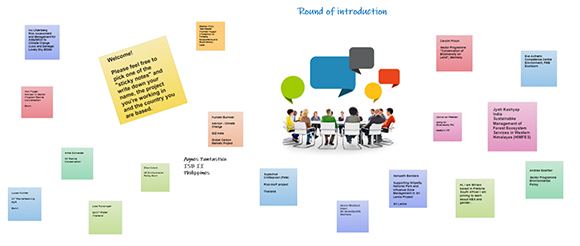
| Virtual exchange on Nature-based Solutions (NbS) held on 19 June 2021. Credit: Carolin Frisch |
After having successfully conducted an Online Training on Nature-based Solutions (NbS) in February, we are eager to further broaden the discussion to other continents and sectors. To get an idea on how relevant this topic is in the context of different GIZ projects, a survey on needs, ideas and ongoing initiatives was carried out. Identified areas of common interest are i.a. NbS and… gender, health, river basin management, and agriculture. The next step will be to jointly implement initiatives. Both the SNRD AP and the Sector Programme Conservation of Biodiversity on Land are ready to support this – hopefully in co-creation with you!
Link to further materials
Contact Person
Carina van Weelden - Speaker
Biodiversity Working Group
Key buzzwords
NbS, post-2020 global biodiversity framework, training
|
 |
|
|
|
|
| |
| New Vietnam forestry strategy represents milestone for sustainable forests |
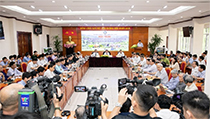
| Launching event of the Vietnam Forest Development Strategy. Credit: Ben Media |
|
|
|
Well managed natural ecosystems, including forests, are the basis for successful environmental protection, biodiversity conservation and climate mitigation. Recognising the important role of forests and protected areas before the background of the urgent need to take action to combat climate change, Viet Nam launched the “Vietnam Forestry Development Strategy for 2021-2030, with a Vision to 2050” (VFDS) and the “One Billion Trees Plantation for 2021-2025” |
project in April 2021. Viet Nam, under the framework of the Forest Biodiversity project, provided support for the strategy’s development, including publication and dissemination.
Link to further materials
Contact Person
Anja Barth - Chief Technical Advisor
Programme on Conservation and Sustainable Use of Forest Biodiversity and Ecosystem Services in Viet Nam
|
|
|
|
|
| |
| Supporting Sundarbans resources users during pandemic-Linking the vulnerable with service providers |
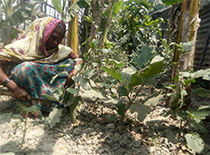
| Beauty Begum, resource users household received external services from Govt. and non-Govt. Agency with the support of SMP. Credit: Kamal Biswas |
|
|
|
COVID-19 has made life hard for families who rely on resource harvesting in the Sundarbans. Beauty Begum, a physically challenged woman and member of Women Group (WG), Joymoni Village Conservation Forum (VCF) in Mongla, Bangladesh, found help though from Sundarbans Management project (SMP). It educates WG members to access services provided by public and private organisations through a ‘Linkage Development Meeting’. During pandemic, she received a disability allowance from a government institution and support from an NGO for goat rearing seeds, fertilizer, that enabled her cope with the situation. Now she is helping other women to access those services. |
Link to IDA Publication
Contact Person
Stefan Alfred Groenewold - Principal Advisor
Support to the Management of the Sundarbans Reserved Forest (SMP II)
|
|
|
|
|
| |
| Sustainable Management of Forest Ecosystem Services in the Western Himalayas (HIMFES) |
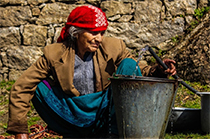
| Woman collecting water in Pathrevi (Himachal Pradesh, India) project site. Credit: Aashima Negi |
|
|
|
HIMFES is a follow-on module of the project, HP-FES (Himachal Pradesh Forest Ecosystem Services) which ended on 31st December 2020. GIZ India is implementing HIMFES project on behalf of the German Federal Ministry for Economic Cooperation and Development (BMZ), in collaboration with the Ministry of Environment, Forest and Climate Change (MOEF&CC), Himachal Pradesh and Uttarakhand Forest Department. The project supports the increased orientation of forest management towards FES with a focus on water availability at the partner states. |
This Technical Cooperation (TC) is an initiative for strengthening the paradigm shift in the forest developmental policies and procedures towards the FES and participatory forest management centric approach, so that forests are managed sustainably for the most important ecosystem services. Read More
Contact Person
Sanjay Tomar - Senior Advisor and Team Leader
Indo-German Biodiversity Programme
|
 |
|
|
|
|
| |
| ToT with nine national training institutes on holistic approach to HWC mitigation |
|
A four-day Training of Trainers for effective delivery of courses on a holistic approach to human-wildlife conflict mitigation was organised for senior trainers and faculty members from nine premier national training institutes of India in a virtual event by the project with Dale Carnegie and the Indira Gandhi National Forest Academy from 11-14 May 2021. Read More |
Contact Person
Ravindra Singh - Programme Director
Indo-German Biodiversity Programme
|
|
|
|
|
| |
| Towards engaging communities to manage Forest Ecosystem Services sustainably in India |
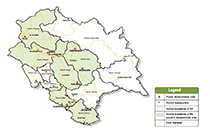
| The HP-FES Project demonstration sites |
|
|
|
Forests play a crucial role in the livelihoods of people, especially in the Himalayas. They provide numerous benefits; such as fuelwood, timber, fodder, Non-Timber Forest Products (NTFPs), regulating water availability, air purity and local climate. These and many other forests’ benefits – defined as Forest Ecosystem Services (FES) – contribute to human wellbeing. The extent to which society benefits from an ecosystem is driven jointly by the ecosystem’s capacity to ‘supply’ services and the use of or |
‘demand’ for those services by beneficiaries. The demands for specific FES often interfere with each other, as no planning on optimising these services from forests exists. An example of such a conflict is intensive grazing in forest areas which are important for water supply.
The paradigm shift towards FES, provides an unambiguous meniscus to exemplify the role of forests in improving and maintaining livelihoods. Prioritisation of specific FES and management focusing on their efficient supply is required to ensure the flow of services which are of utmost importance to the key stakeholders. Read More
Contact Person
Neha A. Owaisy - Junior Communication Officer
Indo-German Biodiversity Programme
|
 |
|
|
|
|
| |
| Transitioning towards Green Recovery: Experiences from Odisha, India |
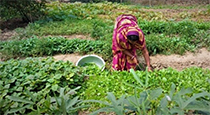
| Vegetable garden at a village in Kedrapara district, Odisha. Credit: GIZ/APOWA |
|
|
|
In 2020, the first wave of the COVID-19 pandemic brought Devjani’s life to a standstill. Residents of Kendrapara district, Odisha, she and her husband, a daily wage labourer, began looking for alternate means of income to support their family of six. At the time, Devjani’s work in the local Self-Help Group had also slowed down, compelling them to live off little savings. Many daily wage labourers began returning to their work in the cities after the first wave, but the |
second wave of the pandemic has endangered lives and means of livelihood again. Kendrapara is home to the Bhitarkanika mangroves which are recognised as wetlands of international importance. It is also a pilot site of the Indo-German project, ‘Wetland Management for Biodiversity and Climate Protection’ supported by IKI-BMU. The Green Recovery initiative for Bhitarkanika was initiated under the Project in January 2021 in partnership with Action for Protection of Wild Animals (APOWA), a not-for-profit organisation based in Odisha to support livelihoods, create avenues for income generation while focusing on conservation and ecosystem restoration in the long term. Read More
Link to further information
Contact Person
Geetha Nayak - Senior Advisor
Wetland Management for Biodiversity and Climate Protection
Key buzzwords
Biodiversity, wetlands, ecosystem services, Odisha, India, Ramsar
|
 |
|
|
|
|
| |
| We’re part of the solution to protect BIODIVERSITY worldwide. The ideas are out there! |
|
The last few weeks highlighted the importance of biodiversity, including the International Day for Biological Diversity on 22 May, the World Environment Day on 06 June, and the World Ocean Day on 08 June. In addition, the UN Decade on Ecosystem Restoration and |
the UN Decade of Ocean Science for Sustainable Development have officially kicked off. These events encouraged a new rise in worldwide awareness and action to preserve our nature. This video shows innovative and pioneering solutions from all over the world for one purpose: protecting our planet and our foundations of life. How much BIODIVERSITY is in your project? What SOLUTION can you offer to protect and restore our planet?
Need more inspiration? Watch this video highlighting PANORAMA’s marine and coastal solutions.
Visit the PANORAMA Platform to find more solutions on conservation topics ranging from Forest Landscape Restoration, Agriculture, Business Engagement, Sustainable Urban Development and many more! Submit your solution to PANORAMA and gain visibility for your unique project!
Link to further information
Contact Person
Merle Immig - Junior Advisor
We4Nature and PANORAMA
|
 |
|
|
|
|
| |
| Working Group Climate Change Adaptation |
|
| Climate Adaptation and Finance in Rural India (CAFRI-NABARD) reducing climate change risks with better governance, active participation and innovative finance models |
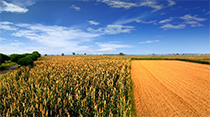
| Pearl millet crop elevated view Haryana/India. Credit: rvimages |
|
|
|
GIZ India is partnering with National Bank for Agriculture and Rural Development (NABARD), the Apex Development Finance Institution in India to mainstream climate risk screening in its development funds and agricultural value chain with a focus on blended finance approaches for adaptation. The goal is to build capacities of actors at various levels during planning and implementation, focusing on specific measures to strengthen strategic interests of women groups. |
Link to further materials
Contact Person
Shailendra Dwivedi - Senior Advisor
Climate Adaptation and Financing in Rural India - National Bank for Agriculture and Rural Development (CAFRI-NABARD)
Key buzzwords
Climate risk screening, public private partnership, blended finance, adaptation, agriculture-value chain, India
|
|
|
|
|
| |
| Empowering Thai Youths for climate-sensitive Water Management: TGCP-Water shares good practices from Germany |
|
The Thai-German Climate Programme-Water (TGCP-Water) shared good practices of Ecosystem-based Adaptation (EbA) from Germany to a group of Thai youth representatives in the webinar ‘Information sharing and Good Practices of Water Resources Management from Germany’ on 4 June 2021. Participating youths had the opportunity to learn about a variety of EbA measures, including the renaturalisation of the Isar River in Germany, |
and how they provide multiple benefits for humans and nature. The webinar was hosted by the Office of the National Water Resources (ONWR) as part of the 10-episode series that aims to enhance knowledge of 50 selected young leaders from 22 river basins under the ‘Youth Leadership Development Programme in the Water Sector’ that ONWR organises to celebrate the World Water Day 2021. Read More
Link to recorded session
Contact Person
Pawattapum Charoensuk - Junior Advisor
Thai-German Climate Program (TGCP) - Water
Tags
#WorldWaterDay2021 #YouthEmpowerment #EbA #TGCPWater #ClimateChange #ClimateAdaptation #IWRM
|
 |
|
|
|
|
| |
| Enhancing Climate Finance Capacity for Policymakers in ASEAN |
|
The Climate Finance Training for Sector Experts (CliFit4SE), held virtually in April 2021, enhanced the climate financing knowledge of 45 policymakers working in the food, agriculture, and forestry sectors in the ASEAN region. The training conveyed practical information on how to access climate funding for implementing regional and national priorities effectively and transparently. Read More |
Contact Person
Zahra Mutiara - Advisor
Climate Smart Land Use (CSLU) in ASEAN
Key buzzwords
ASEAN, Climate Finance, Climate Smart Land Use, Food Security, Climate Change
|
|
|
|
|
|
| |
| Working Group Agriculture |
|
| Agri-Food Policy Advice in GIZ projects |
|
The three GIZ Sector Networks SNRD Africa, SENECA SEDE and SNRD Asia and the Pacific joined forces to get insights into how agri-food policy advice is delivered by GIZ and which criteria are essential for the success of a project. In total, 20 projects took part in the survey and eight case studies were assessed in more detail. The review of principles and good practices of agri-food policy advise aims at further improving GIZ approaches and increasing awareness regarding the importance and effectiveness of agri-food policy advice in facilitating structural changes in the development agendas of our partner countries.
Link to Publication
Contact Person
Lisa Faust - Speaker
Agriculture Working Group
|
|
|
|
|
| |
| develoPPP.de project with Coca-Cola India Pvt. Ltd. and Tetra Pak India Pvt. Ltd. as partners, and SAAHAS as the implementation partner: Alag Karo-Impact Assessment (2017-2019) |
|
Alag Karo is a Hindi term and translates to ‘separate’ in English. The white paper encapsulates findings from the project Alag Karo, which was an awareness and implementation program for source segregation of waste, in the city of Gurugram, located in the state of Haryana in India. Using SROI and IRECS frameworks the paper showcases the additional social and economic benefits that can be leveraged from segregation of waste, particularly for waste collectors. It provides recommendations for municipalities, non-profits, FMCGs and other local stakeholders who want to implement waste segregation in urban areas in a decentralised manner. |
Link to Publication
Contact Person
Vaibhav Rathi - Technical Advisor
GIZ India
Key buzzwords
Waste management, source segregation, circular economy
|
|
|
|
|
| |
| Working Group Biodiversity |
|
| Strategy, Action Plans, Guidelines and Toolkits: HWC Mitigation |
|
This brief document gives a quick outline into the project's holistic approach, various frameworks, guiding elements to be considered and the flow of work towards preparing the national and state strategies and action plans, Standard Operating Procedures, guidelines and toolkits for human-wildlife mitigation in India.
Link to Publication
Key buzzwords
Biodiversity, human-wildlife conflict mitigation, India
|
|
|
|
|
| |
| Managing Forest Ecosystem Sevices in 9 Sites of Himachal |
|
This is a compilation of interventions carried out in 9 sites in the state of Himachal Pradesh. The project developed zone-wise management of Forest Ecosystem Services prioritised by local communities and the Himachal Pradesh Forest Department for all the 9 project demonstration sites in the state: Alha, Bohal, Loharlari, Cheola, Kharota, Ghanduri, Shangarh, Hamta and Pathrevi.
Link to Publication
Key buzzwords
Ecosystem Services, forests, biodiversity, water, awareness, factsheets, pilot sites, India, Himalayas, Himachal Pradesh
|
|
|
|
|
| |
| Working Group Climate Change Adaptation |
|
| Climate-Smart Land Use Insight Brief No. 1: Integrated Agriculture-Aquaculture (IAA) Systems for Climate Change Adaptation, Mitigation and Livelihoods |
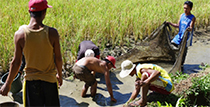
| Farmers in Ilocos Norte (Philippines) catch fish in their rice paddies. Credit: Ilocos Norte |
|
|
|
The IAA paper discusses how integrated farming system and farm diversification will benefit smallholders’ farmers for increasing productivity and their income, while reducing waste. IAA system can be one of the effective adaptations and mitigation measures in addressing climate change impact. The paper is the first publication of the Climate-smart land use practice Insight Brief Series. It consists of total seven papers and is published between May to |
November 2021. The series covers range of topics relevant to climate change mitigation and adaptation potentials. Every Insight Brief concludes with recommendations for policymakers, donors, and project implementers and for further research.
Link to Publication
Contact Person
Diella Dachlan - Communication Advisor
Climate-Smart Land Use (CSLU) in ASEAN
Key buzzwords
Climate and land use, insight, climate, agriculture
|
|
|
|
|
|
| |
| Working Group Hills to Ocean |
|
| The ocean in a changing climate: Rapidly growing risk of loss and damage? |
|
Organized by the Global Programme on Risk Assessment and Management for Adaptation to Climate Change (Loss and Damage), the virtual event discussed potential and already noticeable impacts of climate change on the ocean and coastal zones at the institutional level and with a special focus on the role of development cooperation. Among some of the key issues addressed were the particular vulnerability and importance of small-scale fisheries in the context of food security and livelihoods, especially in least developed countries (LDCs) and small island developing states (SIDS). We would also like invite you to retweet the announcement of the report on Twitter. |
Link to Publication
Contact Person
Nicola Hanke - Advisor
Global Programme, Risk Assessment and Management for Adaptation to Climate Change (Loss and Damage)
|
|
|
|
|
|
| |
| Corals as Commons?! |

| Book Front Cover, Source: Routledge (link below), Copyright: Routledge |
|
|
|
For all coral reef lovers out there – this newly published chapter explains, why it is so difficult for Tourist Guides to commonly manage corals for tourists! The chapter takes you to the beautiful Karimunjawa Island Marine National Park in Indonesia. Corals are referred to as a new common-pool resource – the Marine Tourism Commons! The case study offers insights to the two concepts of commonisation and decommonisation. By using the Social Ecological System Framework, the paper analyses a set of 29 multitier variables that points towards a weak institutional performance in managing the coral reef for marine tourism:
Link to Publication
Contact Person
Patricia Dorn - Project Manager
ASEAN Portfolio (no project)
Key buzzwords
Commons, social ecological system, marine national park, Karimunjawa, Indonesia |
|
|
|
|
| |
| Interesting External Publications |
|
| Consideration for Integrating Nature-Based Solutions in Nationally Determined Contributions Illustrating the Potential Through REDD+ |
|
Reducing emissions from deforestation and forest degradation (REDD+) is a key nature-based solution (NBS) for the forest sector. Drawing on lessons from UNDP’s support to REDD+ countries over the past decade, this paper describes crucial areas for policy makers to consider when seeking to enhance their NDCs and support NDC implementation through NBS. These areas include the unique characteristics of the land use sector, such as risks of reversal of stored carbon; the importance of strong inter-ministerial coordination; linking REDD+ finance to NDC implementation; how to address social and environmental risks and benefits, particularly through contextualizing safeguards at the country level; and finally, building on national forest monitoring systems for REDD+ to apply to measurement, reporting and verification for the NDCs. To enhance NDCs and scale up NDC implementation through NBS, it is critical to build upon existing national initiatives, and for many forested developing countries, REDD+ is a prime example of a national-level effort to build on.
Link to Publication
|
 |
|
|
|
|
|
| |
| Events, Trainings & Webinars |
|
| |
|
|
| |
| Gender is boss business! |
|

Do you want to become a gender-transformative leader and make a difference with your team in your project for gender equality and women empowerment? The ‘Gender Transformative Approaches in Rural Development’ Working Group is launching the ‘Gender Coaching for Transformative Change’, and you as GIZ manager can be part of the journey! For 6 months (July 2021 to February 2022), you will be coached by an experienced and diverse group of gender coaches, during 4 individual and 5 team sessions. The coaching is not a training, but a self-driven learning journey with follow-through actions. It will bring a shift in your thinking behaviour on how to address gender equality and empowerment, whatever your context is. The coaching will be in English.
What do you need to do to register? Send a motivation statement to gta@giz.de by 28.6.2021 which could start like ‘I would like to participate in the ‘Gender Coaching for Transformative Change’ for me, my team and the broader context in which I work because…..’. The selection criteria for the available 15 slots are based on diversity, gender, ethnicity, age and experience in order to have a well-rounded and diverse group at the end. The only requirement is that you are in an official leadership role within GIZ and commit to the total of 9 sessions of gender coaching!
Contact Person
Miriam Heidtmann - Programme Manager
Agricultural Technical Vocational Education & Training for Women (ATVET4W), Skills Initiative for Africa (SIFA)
|
 |
|
|
|
|
| |
| Practical Tools to Make Gender Transformative Approaches Work |
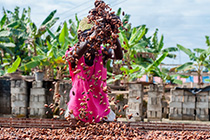
| Cocoa farmer in Ghana drying cocoa beans: one important step in the agricultural value chain to produce tasty chocolate. Credit: Yaw Ansa-Ansare |
|
|
|
What are gender-related constraints and how can projects address them?
These were the kind of questions that had triggered SNRD Africa and its sister network SNRD Asia Pacific to set up action plans in support of gender empowerment and, more specifically, qualified gender in value chains training.
The eight-week-long online training attracted 70 participants from 22 projects working in 18 countries across the Africa and Asia regions. All of them drew gender-sensitive value chain maps, conducted interviews with partners — for as far as Covid-19 regulations permitted — and with a |
comprehensive case study of the respective value chain in their project developed a monitoring plan to measure results towards gender equality and women’s economic empowerment. The training was SNRD’s first online training, offered in French and English. The examined value chains were as diverse as potatoes, groundnut, abaca, rice, roasted cashews, cow milk, cassava, or even honey. After the training participants shared with each other strategies on how they wanted to integrate the new knowledge in their projects and how they thought to best use the practical tools to work more towards a gender-transformative world. With this widely offered training, the two sector networks wanted to place the cross-sectional issue of gender on a higher, more strategic level and to continue to support the new working group on Gender-transformative Approaches in Rural Development.
Want to learn more?
Join the concluding webinar “From gender analysis to gender transformative approaches – Knowledge snacks from the gender training in agricultural value chains” in French on Wednesday, 14 July, 10:30 a.m. – 12:00 p.m. CEST. You will get a chance to dive deep into the gender-sensitive value chain maps and the Reach-Benefit-Empower Framework. The first webinar hold in May in English is documented here. All the training material in English and French can be found here and is available for GIZ staff.
Contact Person
Joy Heitlinger – Community Manager
SNRD Africa
|
|
 |
|
|
|
|
|
| |
| Other Newsletters, Useful Links & Platforms |
|
| |
|
|
| |
AdaptationCommunity.net - The Global Programme Human Mobility in the Context of Climate Change (HMCCC) have launched a global website, a subpage on Climate Change and Migration under the AdaptationCommunity.net. Please click the link for an introduction to the topic of climate change-induced human mobility, publications, and other resources. The global programme operates in the Pacific Islands, the Philippines and the Caribbean, and is supported by a team in Bonn.
GIZ International Forestry Policy Newsletter - Subscribe now to get news and updates on GIZ International Forest Policy. If you would like to receive the GIZ International Forest Policy Newsletter, please send a message to forests@giz.de
GIZ Philippines - Get updated on GIZ Philippines and Pacific
GIZ Thailand - Learn about GIZ Thailand activities and other updates
INA Newsletter
Indo-German Biodiversity Programme - Indo-German Biodiversity Programme Newsletter, Issue 12, March 2021. The newsletter features project updates from across India and interesting thematic articles on the challenges of biodiversity conservation and management from the IGBP projects. Click here to subscribe!
Sector Network TUEWAS - Sector Network Transport, Environment, Energy, and Water in Asia. Click here to subscribe to TUEWAS Newsletter!
SNRD Africa - Stay informed what is happening with our sister network
|
 |
|
| |
|
|
|
| |
| Introducing our new member: Miguel Luis Arias |
|
A message from Miguel:
Dear Colleagues,
I am excited to join SNRD AP and the Climate Change Adaptation WG as an official member!
I started working at GIZ just this February. I function as Technical Advisor for the Philippines in the component of BMZ-funded Global Programme Human Mobility in the |
Context of Climate Change. I have extensive professional experience in project management and capacity development as well as accumulated domain knowledge in skills development and human mobility (labor migration, border management, and migrant reintegration). I have worked with different organizations across different sectors and under different capacities including international organizations such as the UNDP (Turkey); non-profit organizations such as the Blas F. Ople Policy Center and Training Institute (Philippines); government offices such as the Department of Labor and Employment of the Philippines and the Ministry of Business, Innovation and Employment of New Zealand; and the academe. I have a Master’s degree in Public Policy from Central European University (Vienna and Budapest) and Bachelor’s degree in Consular and Diplomatic Affairs from De La Salle-College of St. Benilde (Manila).
In my free time, I usually do food trips (resto hopping), watch different genres of movies and series, hit the gym or an obstacle course – Ninja Warrior style, play table tennis or volleyball, read books, or just chill in a quiet and spacious park. We can connect professionally through LinkedIn (Miguel Luis Arias | LinkedIn). I am looking forward to meet and collaborate with SNRD members digitally!
Best wishes,
Migs (Miguel Luis Arias) |
 |
|
|
|
|
| |
|
Vacancy: (Junior-) Advisor on Agroecology in the sector project Sustainable Agriculture (SV NAREN) - Germany
|
|
An exciting job vacancy at GIZ QQ: (Junior-)Advisor on Agroecology in the sector project sustainable agriculture (SV NAREN) is open for applications. A challenging position to support BMZ in the further conceptual development, implementation strategies and policy advice. The position is in Band 3 or Band 4, depending on the experience. After the end of the term of NAREN (3/2022), an extension of the position to the new sector project Rural Development is planned (07/2024). The job is advertised until 02.07.2021. The position is looking for an experienced colleague with interest to take up a new assignment in an innovative environment in our team.
Link to internal job advert
Link to external job advert
Contact Person
Ingrid Prem – Project Manager
Sector Project Sustainable Agriculture |
|
|
|
|
| |
Published by:
SNRD Asia and the Pacific Secretariat
Deutsche Gesellschaft für
Internationale Zusammenarbeit (GIZ) GmbH
Registered offices
Bonn and Eschborn, Germany
193/63 Lake Rajada Office Complex 16th Fl.
New Rachadapisek-Rama 4 Road,
Klong Toey, Bangkok, 10110 Thailand
E snrd-asia@giz.de
I www.snrd-asia.org
Bangkok 2021
|
Unsubscribe:
Send us an email to snrd-asia@giz.de to unsubscribe.
|
|
|
Editor:
SNRD Asia and the Pacific Secretariat, Bangkok
Design:
Sector Network Coordination Unit, Eschborn
SNRD Asia and the Pacific Secretariat, Bangkok
Photo credits/sources:
As shown under each pictures
URL links:
Responsibility for the content of external websites linked in this publication
always lies with their respective publishers.
GIZ expressly dissociates itself from such content.
GIZ is responsible for the content of this publication.
|
|
|
| |
|
|


